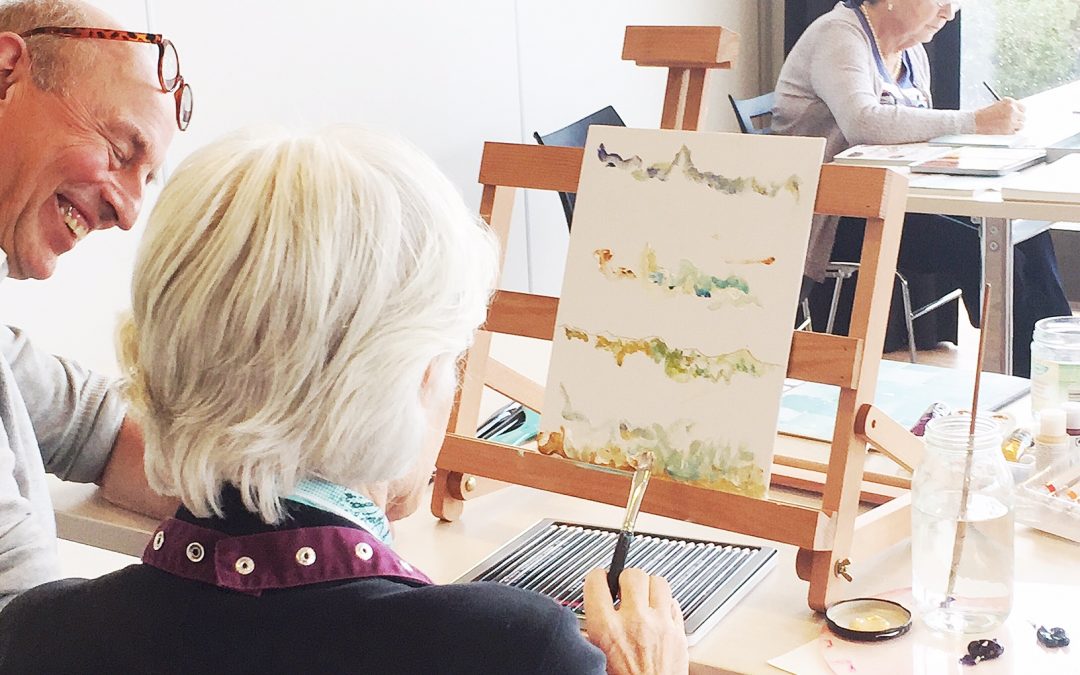21st of September was Alzheimer’s day.
This September also I started a new art workshop in a second care home for people with dementia. It seems to be quite a success so I’m very happy about it. On the first day we had 4 enthusiastic artists, and this week 3. They all made fantastic art.
When working with the people with dementia I realized that art is really a universal language. Some of the inhabitants can’t communicate very well any more, and forget a lot which makes functioning in the world difficult. But there is always a way of communication through art, and when you bring attention and beauty to the person, you get emotions and art in return.
By making art we reconnect with the identity of the dementia patient. We reconnect with them by communication through the art making. We can make a dialogue. Sometimes they paint their feelings, their forgotten memories. And they relax and find some rest and joy. The dementia makes memories, passions and talents go away. The art making brings them back for a while.
This also works very well with music.
This workshop shows especially that the dementia patients are still human beings, with feelings and an identity.
We focus on what they still can do, instead of what they can’t do any more.
They gain self confidence.
Also the people of the caring home and the family can find this way a new way of communication.
This is visible in the interaction we have with them while we’re painting: they start talking about what they’re painting and about the experience. Last week a patient was telling me how this art had to come “out of her” and was “trembling inside her”. She was very joyful while saying that, saying she couldn’t believe she would still be painting.
Communication with people with dementia, like for example with Alzheimer, can be difficult.
An everyday question like “what did you do today?” can make the patient nervous because he or she can’t remember. The following 10 tips from the Dutch Academic Workshop Dementia can help you to make good contact with the people with dementia:
- Make yourself known
Call somebody with their name. Present yourself and explain what you came to do. It can help to wear a name tag. Someone with dementia might not recognize you. - Make contact by paying attention.
place yourself close by the person with dementia. Put yourself on the same level: sit down on a chair or on your knees. Put your head close to theirs and make eye contact. Pay attention to your mimics and make a friendly face. Speak with a soft voice (unless their hearing is bad). Take their hand if they like it. - Keep it simple
Do 1 thing at a time. Speak about one subject at a time and ask 1 question at a time. Keep the tempo slow and avoid annoying background noises. - Pay attention to the reaction
Pay attention to how they react and react to that. Name the feelings you detect in the person (anger, sadness, joy, fear…) - Confirm feelings
confirm feelings of sadness or anger. Give space to the person to show feelings and don’t deny them or don’t ignore them. Don’t say “I also happen to forget things”, but instead confirm that it’s terrible to forget so much… - Know their life
pay attention to the important happenings or periods in someones life. Ask the family if you need. Or ask about objetcs that mean a lot to the person. - Give compliments
Give the person with dementia a lot of compliments. Thank them a lot if they helped you with something. Avoid to correct them and don’t punish them. - Take the persons with dementia seriously
Take what they tell you seriously and don’t laugh with them. Try to get to know what they want to tell you by asking questions and by repeating things they say. - Don’t ask for facts or happenings of today or yesterday
Ask “how was your day”, or “did you have a nice day”. Don’t ask specific questions like “what did you do today “ or “how did you like your daughter’s visit?” - Show concern and interest
Show interest for someone’s story, even if you already heard it several times. Ask how the person lived the event and how they felt about it
On this page you can read some more about my art workshop and how it started : http://barbaraluel.com/art-for-dementia/
This work brings me warmth, inspiration and human connection with great people.
I learned to accept more vulnerability, patience and I learned to let go: you have to let go of things you can’t control (I used to be a real control freak and perfectionist). You have to let go of the person they were, and of what they can’t do anymore, and if you can do that, everything is possible and you get access to a whole new world and to the new person they have become. If you don’t hold on to the past that isn’t there anymore, you’ll be able to better enjoy the present moment.
I learned to see the illness without fear. There’s nothing to be ashamed or frightened of.
The people with dementia also give me a kind of connection with my inner child, with their spontaneity. I think this brings also more spontaneity to my art and to my person.
I’m curious if you have experiences or difficulties in communication with people with dementia? If you do please share your experience in the comments below so everybody can read them and be helped by your experience.
The more we communicate about this, the better we’ll be able to care.
Did you try to make art with them? Grab your paint or your color pencils and a piece of paper and enjoy.

